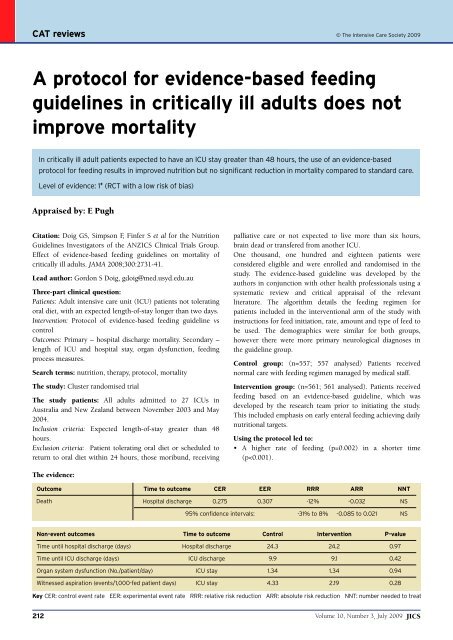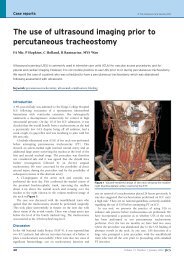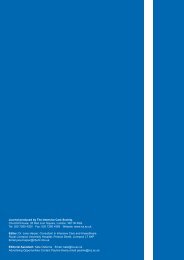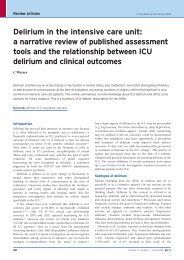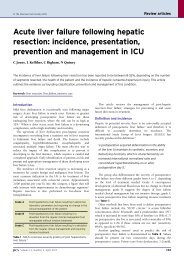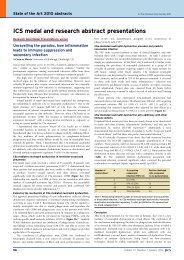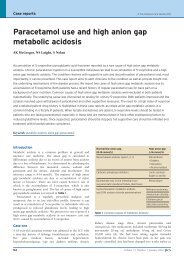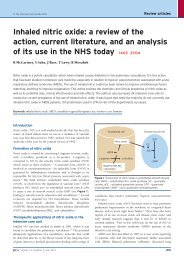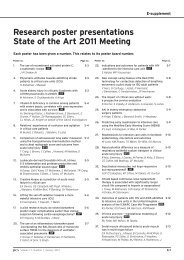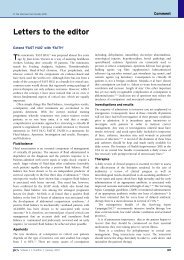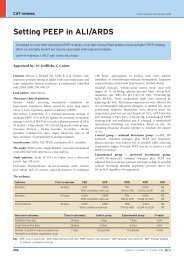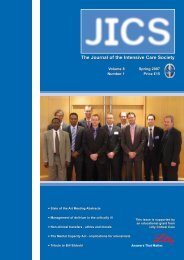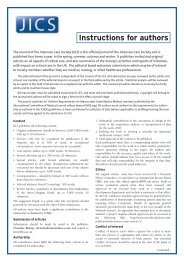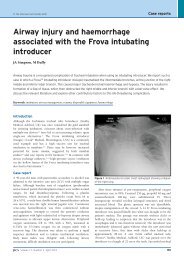Full text - JICS - The Intensive Care Society
Full text - JICS - The Intensive Care Society
Full text - JICS - The Intensive Care Society
Create successful ePaper yourself
Turn your PDF publications into a flip-book with our unique Google optimized e-Paper software.
CAT reviews © <strong>The</strong> <strong>Intensive</strong> <strong>Care</strong> <strong>Society</strong> 2009<br />
A protocol for evidence-based feeding<br />
guidelines in critically ill adults does not<br />
improve mortality<br />
In critically ill adult patients expected to have an ICU stay greater than 48 hours, the use of an evidence-based<br />
protocol for feeding results in improved nutrition but no significant reduction in mortality compared to standard care.<br />
Level of evidence: 1 + (RCT with a low risk of bias)<br />
Appraised by: E Pugh<br />
Citation: Doig GS, Simpson F, Finfer S et al for the Nutrition<br />
Guidelines Investigators of the ANZICS Clinical Trials Group.<br />
Effect of evidence-based feeding guidelines on mortality of<br />
critically ill adults. JAMA 2008;300:2731-41.<br />
Lead author: Gordon S Doig, gdoig@med.usyd.edu.au<br />
Three-part clinical question:<br />
Patients: Adult intensive care unit (ICU) patients not tolerating<br />
oral diet, with an expected length-of-stay longer than two days.<br />
Intervention: Protocol of evidence-based feeding guideline vs<br />
control<br />
Outcomes: Primary – hospital discharge mortality. Secondary –<br />
length of ICU and hospital stay, organ dysfunction, feeding<br />
process measures.<br />
Search terms: nutrition, therapy, protocol, mortality<br />
<strong>The</strong> study: Cluster randomised trial<br />
<strong>The</strong> study patients: All adults admitted to 27 ICUs in<br />
Australia and New Zealand between November 2003 and May<br />
2004.<br />
Inclusion criteria: Expected length-of-stay greater than 48<br />
hours.<br />
Exclusion criteria: Patient tolerating oral diet or scheduled to<br />
return to oral diet within 24 hours, those moribund, receiving<br />
palliative care or not expected to live more than six hours,<br />
brain dead or transfered from another ICU.<br />
One thousand, one hundred and eighteen patients were<br />
considered eligible and were enrolled and randomised in the<br />
study. <strong>The</strong> evidence-based guideline was developed by the<br />
authors in conjunction with other health professionals using a<br />
systematic review and critical appraisal of the relevant<br />
literature. <strong>The</strong> algorithm details the feeding regimen for<br />
patients included in the interventional arm of the study with<br />
instructions for feed initiation, rate, amount and type of feed to<br />
be used. <strong>The</strong> demographics were similar for both groups,<br />
however there were more primary neurological diagnoses in<br />
the guideline group.<br />
Control group: (n=557; 557 analysed) Patients received<br />
normal care with feeding regimen managed by medical staff.<br />
Intervention group: (n=561; 561 analysed). Patients received<br />
feeding based on an evidence-based guideline, which was<br />
developed by the research team prior to initiating the study.<br />
This included emphasis on early enteral feeding achieving daily<br />
nutritional targets.<br />
Using the protocol led to:<br />
• A higher rate of feeding (p=0.002) in a shorter time<br />
(p
CAT reviews<br />
• A higher rate of feeding within 24 hours of ICU admission<br />
(p


